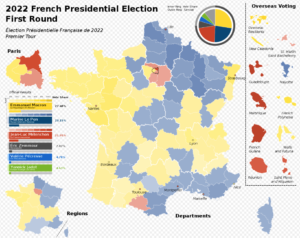 Here we go again, or maybe I should say, on y va encore une fois (if that’s wrong, don’t blame me, blame Google Translate).
Here we go again, or maybe I should say, on y va encore une fois (if that’s wrong, don’t blame me, blame Google Translate).
Way back in the spring of 2017, the world’s growing far-right nationalist movement was poised to strike a great victory in France, the epicenter of the snooty elite. Marine Le Pen, unapologetically anti-immigrant and anti-establishment, was sitting atop the nation’s Presidential polls and favored to win it all.
Le Pen spent practically her entire adult life in politics working and waiting for this moment. As other parties rose and fell, her National Rally party steadily grew. It was founded in 1972 by her father Jean-Marie Le Pen, who secured a paltry 0.7% of the vote during his first attempt for the Presidency in 1974. In 1988 and 1995, though, the elder Le Pen improved to 14.4% and 15.0% respectively. By 2002, 16.9% was enough to get him into the top two run-off (even if he was eventually resoundingly beaten 82.2% to 17.8% in the second round).
Although she had to undertake a concerted effort to distance herself from her father and his most toxic beliefs, Le Pen’s efforts finally appeared to be paying off. Yet in the final days before the first round of voting, Emmanuel Macron and his newly created centrist party sprinted ahead. Ultimately Macron (24%) came out ahead of Le Pen (21.3%), albeit both qualified for the run-off set two weeks later.
Increased scrutiny, and a poor debate performance, hurt Le Pen’s standing during those final weeks. Then, just two days before the final vote, thousands of Macron’s campaign emails were leaked online and shared by WikiLeaks. Coming only months after the Russian interference in the 2016 U.S. presidential election, many immediately suspected a connection, especially given Le Pen’s cozy relationship with Vladimir Putin. Eventually investigators would conclude Russia was indeed likely involved, but the endeavor made little difference in the end.
While Le Pen’s 33.9% was an all-time high for her party, she still lost to Macron by over 30 points.
Fast forward five years and Le Pen is arguably in the opposite situation. After starting 2022 behind by double digits, she has steadily gained in the polls over the last few weeks. In contrast to 2017, now it’s the incumbent Macron who is wilting under the spotlight.
France hasn’t exactly been kind to its recent sitting Presidents. That 2002 run-off that Jean-Marie lost was the last instance of an incumbent President winning a second five-year term. So Macron was already facing a bit of an uphill battle before being hit by a myriad of political obstacles: a society burned out on multiple COVID waves and inflated prices, bubbling resentment towards elites, and Russia’s invasion of Ukraine.
With that backdrop, France held the first round of its 2022 Presidential election this weekend. Before we get to those results, it’s worth laying out how the French system works. While our American government has been going strong (sort of) since 1789, the French are on their fifth attempt at a republic. Such a history creates some incongruities. For instance, although they have a presidential system, their past experience with a parliament means that France has an ever-evolving crop of political parties. As a result, ten candidates received at least 1% of the vote in the first round.

Macron maintained the top spot with 27.84%, while Le Pen earned second place and advanced to the top two run-off by garnering 23.15%. Jean-Luc Melenchon, representing his own recently created leftist party, finished just short of Le Pen at 21.95%. Meanwhile Eric Zemmour, who started his own far-right party in an attempt to outflank Le Pen, saw his support underperform his polls as he secured just 7.07%.
Le Pen was strong in the Northeast and Southeast, the areas where her party has traditionally done best. Meanwhile Macron was able to win over a few regions, Normandy and Centre-Val de Loire, that Le Pen won in the first round of their 2017 battle. Melenchon’s strength was in eastern Paris and the surrounding regions, voters Macron will need in the second round.
Melenchon’s voters are seen similarly to Bernie Sanders’ supporters here in America, and the left-wing champion made a familiar call for them to oppose Le Pen.
“We know for whom we will never vote!,” he declared during his election night remarks. “You must not give your vote to Madame Le Pen!” Whether they follow his call to action could determine the ultimate result.
The second round of the 2022 France Presidential Election is set for April 24th.